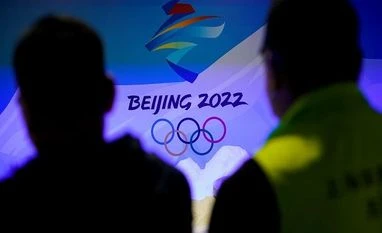A pile of figure-skating rubble created by Russian misbehavior. A new Chinese champion from California. An ace American skier who faltered and went home empty-handed. The end of the Olympic line for the world's most renowned snowboarder. All inside an anti-COVID closed loop" enforced by China's authoritarian government.
The terrarium of a Winter Games that has been Beijing 2022 wound to its end Sunday, capping an unprecedented Asian Olympic trifecta and sending the planet's most global sporting event off to the West for the foreseeable future, with no chance of returning to this corner of the world until at least 2030.
It was weird. It was messy and, at the same time, somehow sterile. It was controlled and calibrated in ways only Xi Jinping's China could pull off. And it was sequestered in a "bubble" that kept participants and the city around them and, by extension, the sporadically watching world at arm's length.
By many mechanical measures, these Games were a success. They were, in fact, quite safe albeit in the carefully modulated, dress-up-for-company way that authoritarian governments always do best. The local volunteers, as is usually the case, were delightful, helpful and engaging.
The Chinese people embraced these Games. Even in the closed loop, we could make this experience of excitement, of warmth, of hospitality and of friendliness, International Olympic Committee President Thomas Bach said Friday.
There was snow most of it fake, some of it real. The venues many of them, like the Bird's Nest and the Aquatic Center, harvested from the 2008 edition of the Beijing Olympics performed to expectations. One new locale, Big Air Shougang, carved from a repurposed steel mill, was an appealingly edgy mashup of winter wonderland and rust-belt industrial landscape.
More From This Section
TV ratings were down, but streaming viewership was up: By Saturday, NBC had streamed 3.5 billion minutes from Beijing, compared to 2.2 billion in South Korea in 2018.
There were no major unexpected logistical problems, only the ones created deliberately to stem the spread of COVID in the country where the coronavirus first emerged more than two years ago.
And stemmed it seemed to be. As of Saturday, the segregated system that effectively turned Beijing into two cities one sequestered, one proceeding very much as normal had produced only 463 positive tests among thousands of visitors entering the bubble since Jan. 23. Not surprisingly, the state-controlled media loved this.
The success in insulating the event from the virus and keeping disruption to sports events to a minimum also reflected the effectiveness and flexibility of China's overall zero-COVID policies," the pro-government Global Times newspaper said, citing epidemiologists who say "the COVID-19 prevention experience accumulated from this Olympics can also inspire Chinese cities to adjust their policies.
Look deeper, though, and a different story emerges about these Games.
Internationally, many critiqued them as the authoritarian Olympics and denounced the IOC for holding them in concert with a government accused of gross human rights violations against ethnic Uyghurs and Tibetans in its far west and harsh policies against Hong Kong democracy activists off its southeastern coast. Several Western governments boycotted by not sending any official delegations, though they sent athletes.
For its part, China denied such allegations, as it typically does, and featured a Uyghur as part of its slate of Olympic torch-carriers for the opening ceremony Feb. 4.
And then, of course, there were the Russians. And doping. Again.
The 15-year-old Russian figure skater Kamila Valieva tested positive for using a banned heart medication. The result wasn't announced by anti-doping officials until after she'd won gold as part of the team competition, even though the sample was taken weeks earlier.
The Court of Arbitration for Sport cleared her to compete in the individual discipline, ruling that as a minor she had protected status. But Valieva, although heavily favored to win, fell several times during her free skate routine, landing her fourth place and prompting a cold reception from her embattled coach, Eteri Tutberidze.
"Rather than giving her comfort, rather than to try to help her, you could feel this chilling atmosphere, this distance," Bach said the next day, proclaiming his outrage.
Valieva's Russian teammates took gold and silver, but on a night of drama that seemed destined to define these 2022 Games, even the winners were in tears. The affair produced one possible legacy for Beijing: Valieva's ordeal has inspired talk of raising the minimum age for Olympic skaters from 15 to 17 or 18.
American skier Mikaela Shiffrin also came to Beijing with high expectations, only to see them dashed when she failed to finish three races. Her American teammates didn't do much better. She left without any medal at all. In an image to remember, the TV cameras captured Shiffrin sitting dejectedly on the snow, head in hands, for several minutes.
The 2022 Games were controversial from the moment the IOC awarded them to Beijing, the frequently snowless capital of a country without much of a winter sports tradition. Almaty, Kazakhstan, was the only other city in play after four other bids were withdrawn due to lack of local support or high cost.
Geopolitical tensions also shadowed these Games, with Russia's buildup of troops along its border with Ukraine spurring fears of war in Europe even as the Olympic Truce supposedly kicked in.
The unease didn't stop Russian President Vladimir Putin from showing up at the opening ceremony after meeting privately with Xi. He waved from a luxury box to Russian athletes unable to compete under their nation's flag as part of sanctions imposed for a massive state-sponsored doping operation uncovered after the 2014 Sochi Games that Putin hosted.
China swelled with pride, and its social media swelled with comments, as Eileen Gu, an America-born freestyle skier who chose to compete for China, her mother's native country, became an international superstar.
)